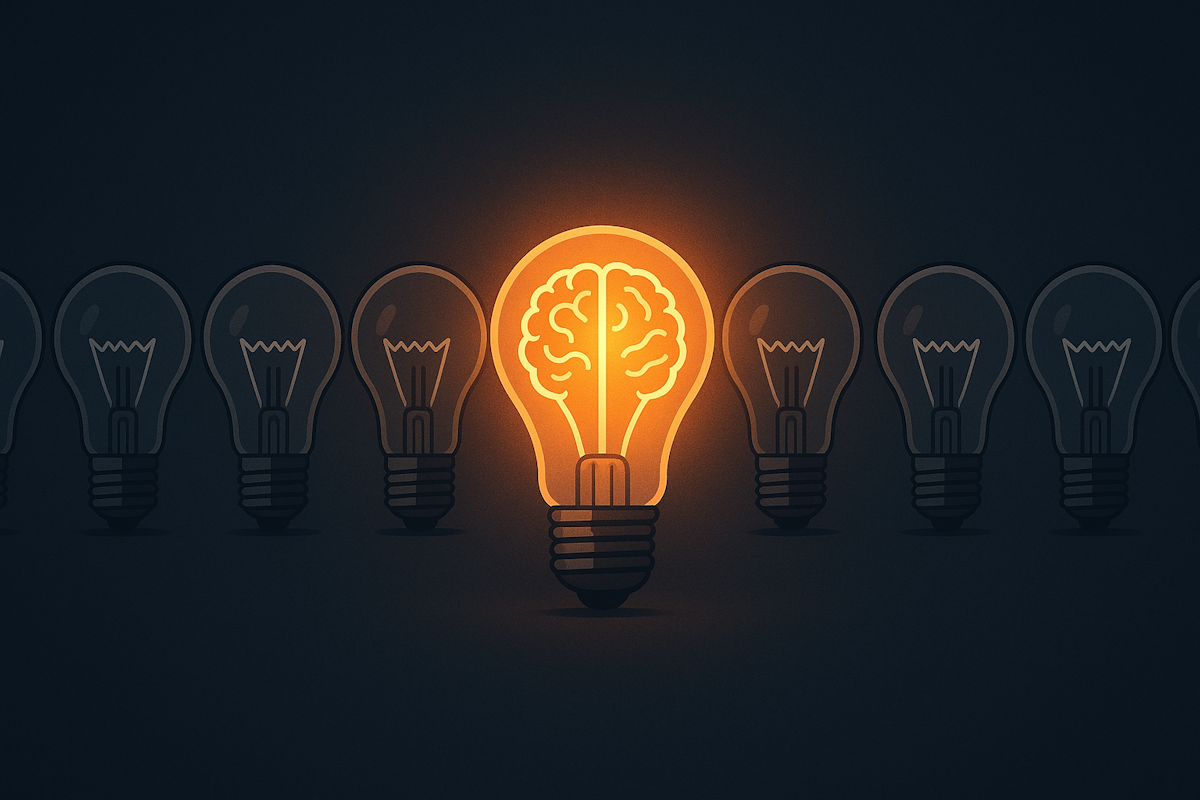
Why the Future Still Belongs to the Original Thinkers
(and the Potential Crisis of Competent Sameness)
I say potential because I’m not an AI expert.
But I do like to look around.
And looking around right now, nearly every business has announced an AI agenda.
Everyone’s hiring AI whisperers and prompt ninjas, running pilot programmes, posting their AI vision for investors and customers alike.
Yet dig a little deeper, and you’ll find a different story.
Many projects stall, budgets get trimmed, and ROI remains elusive.
The reality behind the rhetoric
- 42% of enterprises reported abandoning most of their AI initiatives this year, up from 17% last year (S&P Global).
- Up to 80% of AI projects fail, which is about twice the rate of non-AI IT projects (IHL Group).
- Around 88% of AI pilots never reach production (CIO).
- 95% of enterprise GenAI pilots delivered no measurable P&L impact (MIT).
- 70–85% of deployments fail to meet expectations due to poor data hygiene, governance, and misfitting infrastructure (NTT Data).
- While most firms invest in AI, only a small fraction consider themselves truly ready (McKinsey & Co.).
It makes me wonder why.
One possibility is that the talk has raced ahead of the work; that the signal of “AI readiness” has proved easier than the substance of “AI delivery.”
The result?
A flurry of announcements, a minority of breakthroughs, and a growing gap between expectation, experience, and positive returns.
The real paradox:
In our rush to adopt AI, we’re flattening differentiation; risking the very originality that once gave us our edge. The things that made what we do appealing, valuable, and human.
The paradox of progress
AI has levelled the playing field, but it’s also flattening it.
It raises the floor by making average work easier, cheaper, and faster, but it also lowers the ceiling.
When everyone uses the same engine, trained on the same history, prompted in the same tone, differentiation starts to decay.
We trade originality for efficiency, and before long, everything starts to look and sound the same. Competent, but soulless.
Losing the minds that made the magic
“Shit that arrives at the speed of light is still shit when it gets there.” Thank you, David Abbott.
Throughout history, great leaps in art, science, and business came from people who thought differently, not just faster.
They developed taste, intuition, and judgement by doing the hard work, not skipping it.
If we start replacing the most experienced thinkers and creators with “just AI it,” we don’t just lose jobs, we lose culture.
We lose the mentorship chain. The invisible system that teaches younger talent how to think, question, and create.
When you remove the path to mastery, you remove the people who might one day become masters; the people who will continue to push the world forward.
Judgement, not generation
AI can produce a thousand versions of anything.
But only humans can, and should, decide what deserves to exist.
That becomes the new creative divide.
Tomorrow’s value won’t come from knowing how to use the tool, but from learning how to wield it with intent:
- To recognise what’s interesting.
- To feel what’s missing.
- To bring context, emotion, and purpose to the output.
That’s the difference between someone who prompts and someone who provokes.
And we mustn’t lose the joy of poking around, questioning things, and bashing ideas together until something new emerges.
The case for human distinction
As AI spreads, the advantage shifts from what you can produce to how you can think.
The most valuable skills won’t be technical; they’ll be conceptual:
- Framing problems in ways no model can.
- Asking the question that no dataset anticipates.
- Seeing the pattern that doesn’t yet exist.
- Creating remarkable things that people want to talk about with other people.
In a sea of sameness, human distinctiveness becomes the only real differentiator.
The future we choose
We can use AI to make everything faster or to make everyone a little bit smarter, which is not a bad thing.
We can pursue efficiency for its own sake or enrichment for everyone’s.
Because AI itself isn’t the danger, indifference is.
If we use it to amplify imagination, we’ll enter a new creative age, which sounds bloody fantastic to me.
The wonder of human creativity has never ceased to amaze.
If we use it to replace it, we’ll end up with a world of competent sameness; efficient, impressive, and entirely forgettable.
